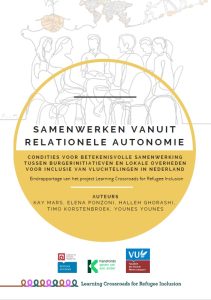The Learning Crossroads for Refugee Inclusion project investigates citizens’ initiatives promoting the social participation and inclusion of refugees. In light of the influx of refugees that arrived in the Netherlands since 2015, several community initiatives and organizations with the aim to contribute to the reception and integration of refugees have emerged. This project addresses several questions with the objective to reflect on these community initiatives: Where are we after four years? What are the achievements of these initiatives? What are some important lessons we should learn from each other? And how can we collectively learn from and with each other? Last but not least, how can we retain the positive energy of these community initiatives and how can we convert this energy into sustainable structures that contribute to the societal inclusion of refugees?
During this project, we first make a general mapping of initiatives that support refugees in the Netherlands. Our first mapping of these initiatives can be found on this page. Subsequently, we retrace the trajectories of several community initiatives in order to map out what has occurred in the past years and write up the ‘life story’ of selected networks and organisations’. Armed with this qualitative mapping, we expand our research to other (networks of) initiatives in order to follow up and obtain more insight into the trajectories, power relations and dilemmas present. We will then bring community initiatives together in a multi-year learning trajectory. Through participatory research and a series of interactive meetings, this project aspires to contribute to the sustainability of community initiatives and organizations. The Refugee Academy is doing this by offering a (online and offline) platform where initiatives can learn from each other, where they are inspired by scientific insights and where their perspective is broadened by the insights from experts with a refugee background. The co-creation of academic, professional and local knowledge is central in this learning trajectory. Using this platform, small-scale initiatives can share experiences and knowledge so that they may become more capable to have challenging discussions with municipalities and other established social partners. Furthermore, we aim to create an environment wherein stakeholders can reflect on the current Dutch policy context concerning refugee inclusion and integration, which despite good intentions, often falls short.
The findings of the project have been published in the final report titled “Collaborating from Relational Autonomy: Conditions for Meaningful Collaboration between Citizen Initiatives and Local Governments for Refugee Inclusion in the Netherlands.” The complete report is available for download here.

Supported by Kansfonds
For more information go to the Learning Crossroads for Refugee Inclusion-website website.

